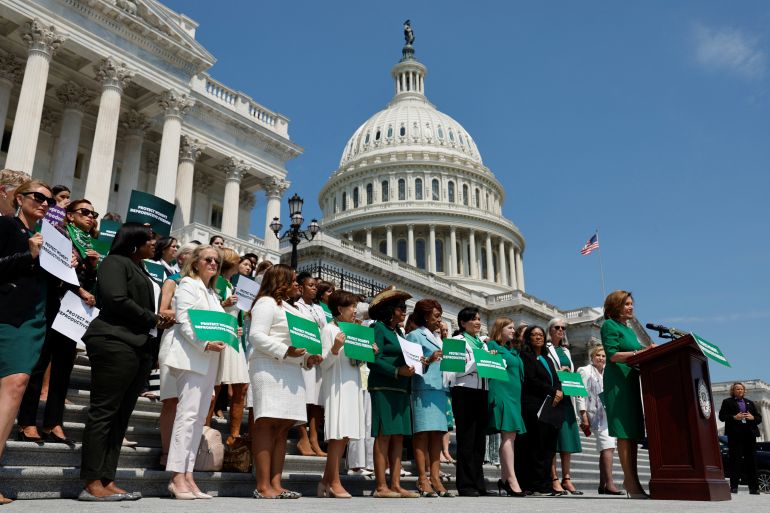US House passes bill protecting contraception access
Democrats are worried that rights such as gay marriage and birth control could be struck down by Supreme Court.

The US House of Representatives has passed a bill guaranteeing the right to contraception, as Democrats grow worried that the conservative US Supreme Court could strike down that right in the future.
The bill passed Thursday with eight Republicans joining 220 Democrats to vote yes. The law faces an uncertain future in the evenly divided US Senate, where Democrats have a slim majority and need 10 Republican votes to overcome a filibuster.
Keep reading
list of 3 itemsTexas contests federal order to grant life-saving abortions
US House votes to restore abortion rights after end of Roe
“We need federal legislation to make it absolutely clear that people have the right to use and buy birth control,” Democratic Representative Kathy Manning, the bill’s sponsor, said in an interview, the Reuters news agency reported.
Following the June 24 Supreme Court decision to overturn Roe v Wade, a 1973 ruling that enshrined the federal constitutional right to an abortion, Democrats have become worried that rights they had previously seen as settled, such as gay marriage and contraception, could be threatened.
In response, Democrats in the House have passed several bills that would guarantee those rights under federal law. On July 20, the House passed a bill to make same-sex marriage legal, but it too faces uncertain prospects in the Senate. In the House, 47 Republicans voted for that law while 157 voted against it.
The House also passed a bill last week guaranteeing the right to abortion under federal law, which passed on party lines and is not expected to move forward in the Senate.
Democratic Speaker of the House Nancy Pelosi said Democrats would “continue fighting ferociously to defend Americans’ fundamental freedoms” after the bill passed the House, with every Republican voting against it.
Republicans have downplayed the idea that rights such as same-sex marriage and birth control are under threat, with Republican Representative Cathy McMorris Rodgers saying there was a “clear distinction” between contraception and abortion.
However, conservative Supreme Court Justice Clarence Thomas wrote in his opinion in the Dobbs v Jackson ruling – which overturned Roe v Wade – that the court should consider revisiting other cases that had guaranteed the right to contraception and gay marriage, which relied on similar legal arguments.
Some state legislatures have promoted bills that would restrict contraception access, but they have not passed. A dozen states allow health providers to refuse contraception, according to the pro-abortion rights Guttmacher Institute.
A number of Republican-controlled states have also passed harsh abortion bans, some without exceptions for rape, incest, and even the life of the mother. Those exceptions were previously seen as points of consensus even among anti-abortion rights advocates.
Democrats hope the bills will draw a vivid contrast between their party and the GOP, who they have sought to portray as increasingly extreme on social issues ahead of the November 8 midterm elections, where the two parties will battle for control of Congress.
The passage of the bills also comes amid growing demands from the Democratic Party’s left flank for more aggressive steps to guarantee rights that could come under threat from the Supreme Court. In the aftermath of the court’s decision ending the right to abortion, the party’s leadership was criticised for what some saw as a lack of urgency.
With the Supreme Court firmly in the grip of conservative justices, who hold a 6-3 majority on the court, Democrats have turned to the legislative branch to protect rights like contraception and gay rights.
But the existence of the filibuster, a procedural rule that allows a single legislator to block any bill that does not have 60 votes in the Senate, could throw that strategy into question. Democratic President Joe Biden has endorsed a carve-out for the filibuster to protect abortion rights, but a number of Democrats in Congress oppose that action.